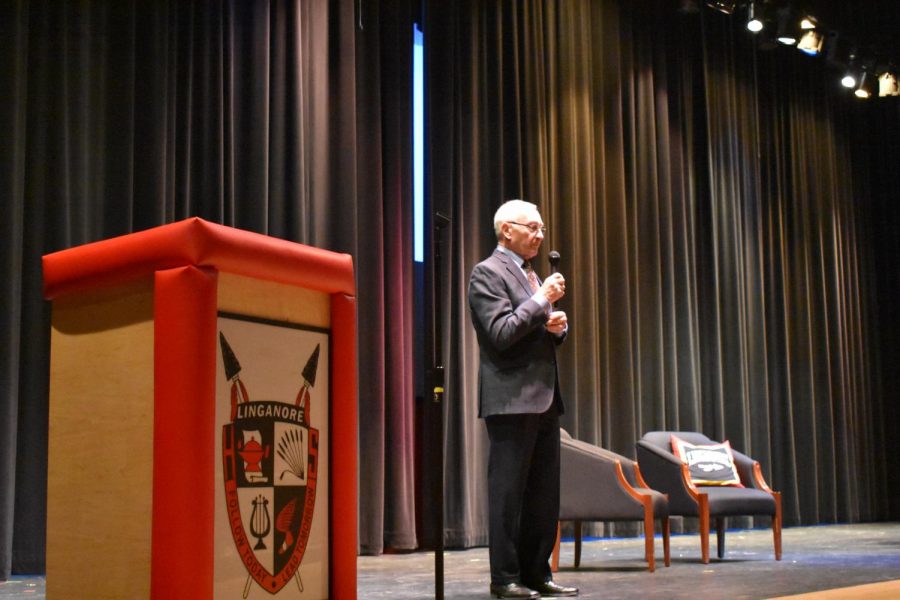Holocaust survivor Nat Shaffir shares his story: Photo of the Day 4/24/18
Nat Shaffir shares his story with Linganore.
April 25, 2018
On April 23, as a part of Linganore´s new lecture series, Holocaust survivor Nat Shaffir visited to share his story.
Christine Cline, clerical assistant and organizer of the lecture series learned about 82-year-old survivor Nat Shaffir, while watching NBC 4. Cline got in contact with Shaffir´s assistant who works alongside Shaffir at the United States Holocaust Memorial Museum in Washington, D.C. Shaffir, one of only 80 Holocaust survivors who work at the museum, agreed to come speak at Linganore.
Linganore students quickly began excited to listen to what Shaffir had to say. Over 400 students signed up to see him speak. The students listened diligently and were ready to ask questions regarding his speech.
After listening to Shaffir talk about his story, junior Rachel Morin said, “I thought Nat Shaffir´s presentation was inspiring. Growing up we learn about the Holocaust, but listening to someone speak about it first-hand was amazing.”
Shaffir grew up in a small farm community in Hungary. He lived a relatively normal life. However, in November of 1942, when his neighbor, a priest who knew the family was Jewish, came to his doorstep with police officers at his side. Shaffir´s entire life changed forever.
Despite their efforts to reason with the officers, the Shaffir family was given no option but to pack up their belongings and relocate to a ghetto outside of the large city of Iasi. Upon arrival, the family was given one bedroom and was told their limitations. These laws included that they were not allowed to attend school; Jewish worship was outlawed; everyone does manual work for no pay; anytime you leave the premises you must wear a yellow star; and you will receive rations of food.
Shaffir, being the only son, was given the job to walk 12 miles to pick up the bread and kerosene rations. He often returned home with a bloody face, and sometimes even without bread, because people would see his yellow star and know that he was a Jew.
The family did everything they could to survive. Old farmers, who wanted to thank his father for the work he has done, designed a way of dropping the family off a sack of extra food when the food trucks came in the middle of the night.
Shaffir also bargained with the kerosene administrator to allow him to work alongside of him in exchange for extra rations and kerosene. Over time, the two of them developed a relationship, which led to the administrator giving him extras from his lunch.
Shaffir’s mother, who worked as an orderly at a hospital, saved the life of a young child of a police officer. To express his thanks, the officer gave her extras, including chocolates.
Even with the extras, the family still suffered greatly. In February of 1949, every male from age 18-50 living in a ghetto, was shipped out to a concentration camp to work.
When Nat´s father left, he told him, “Nat, take care of the girls.”
The stress and worry of being told those words by your father at such a young age, forever left a mark in Shaffir´s life,
In April of 1945, bombs flew over the ghetto for two days straight. The Russians were liberating all of the captured Jews.
Soon after, men began returning from concentration camps. The family remained hopeful, and Shaffir’s father returned. They stayed in the ghetto for three days before leaving to find their old farm. Unfortunately, their farm had been taken over and they were forced to relocate to Israel. At first, their petition to move was denied, but after the officer of the son whose Shaffir´s mother had saved had pulled some strings, but the family left to begin their new life.
Many students have read about the Holocaust, but Shaffir’s point of view, sharing about relocation after the war, was a unique perspective.
After 10 years of living in Israel. Shaffir decided to move to the United States to follow in his uncle’s footsteps. He has lives in the United States for 57 years.
Shaffir’s final request to students is to keep his story alive.
Shaffir said, “I have one request and that is that when you leave and you go home, that you share my stories with your friends. You all are my new voice.”
Shaffir does not want his story, and the stories of thousands of others Holocaust survivors´ stories to be forgotten. His story tells the harsh cruelty of the time Hitler took control, and fears that in years to come the new generation will no longer know what happened during 1933-1945. Do not let this be true, continue to share his story and inform people of the world’s tragedy.
Shaffir´s parting words were, “In the 40´s our enemy was Hitler. Today, our biggest enemy is time.”
The Frederick News Post featured Shaffir’s talk on April 24.






